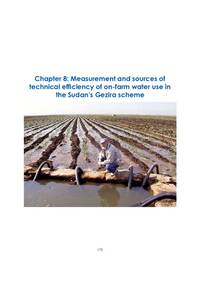Measurement and sources of technical eficiency of on-farm water use in the Sudan’s Gezira scheme

Authors:
The literature identifies two common approaches for estimating technical efficiency. One approach is based on non-parametric, non-stochastic, linear programming. This suffers from the criticism that it does not take into account the possible influence of measurement error and other noise in the data (Coelli, 1995). The second approach uses econometrics to estimate a stochastic frontier function, and to estimate the inefficiency component of the error term. The disadvantage of this approach is that it imposes an explicit and possibly restrictive functional form on the technology. However, this approach is chosen here because it permits estimation of the determinants of the inefficiency of the producing unit, which is the focus of this study.
